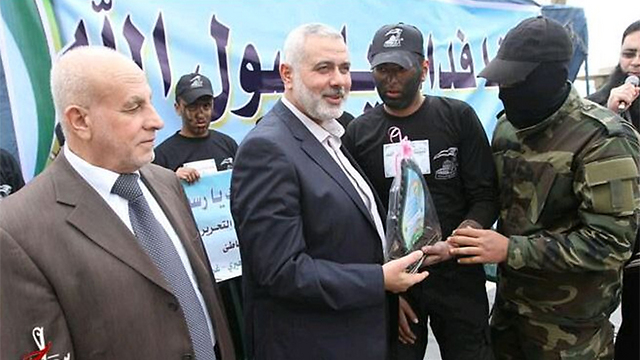
For the sake of security, let Hamas rebuild Gaza
Op-ed: Israel and the international community are making a big mistake in their political insistence to give the resources for the Strip's reconstruction only to the Palestinian Authority.
What should Israel do? The answer to this question must be based, as always, on a sharp and narrow definition of the national interest.
Well, the Israeli interest regarding Gaza is security-related only, and is reflected in two ways: Maintaining a state of calm for as long as possible and reducing Hamas' arming. Israel has no other interest – neither territorial nor political nor economic.
The fulfillment of the Israeli interest can allegedly be done in three ways: One, reaching a permanent agreement with the Palestinian Authority, which will also solve the Gaza problem; two, continuing the economic pressure on Gaza until the Hamas regime might fall; three, reinforcing the interest we share with Hamas to avoid another violent round.
It seems that the third way is the only realistic and practical one.

How is it done? The ceasefire agreement after Operation Protective Edge stated that the second stage, a Egypt-led conference on Gaza's reconstruction, will begin within a month. Eight months have passed, and there is no conference and not much of a chance that such a conference will convene.
The reason is simple: The two elements which are supposed to be leading the move – Egypt and the Palestinian Authority – are not really interested in Gaza's reconstruction. Moreover, these two elements are indifferent to the possibility of another violent round between Israel and Hamas.
This has created a strange situation in which there is a clear meeting of interests between Israel and Hamas, and on the other hand a coalition of elements, including Egypt and the PA, which are not really interested the Gaza residents' suffering and don’t really care if the suffering and frustration there lead to a renewed military conflict.
The political insistence of Israel and the international community to only give the PA the resources for Gaza's reconstruction is a big mistake. In such a situation, Israel is the one which should initiate the international move of rebuilding the Strip. The resources for the reconstruction should be given to the effective government in Gaza, the Hamas government.
Since our interest is purely security-related, we can show generosity in every other area, including in regards to the establishment of a seaport in Gaza, and in return insist on a strong international mechanism which will prevent the means from being misused. Absurdly, when there is no acceptable international supervising mechanism, the cement Israel transfers to Gaza is easily used for building tunnels.
If another military battle is launched this summer, some will say that the Israeli deterrence failed, but that's not the case. The deterrence is efficient, but it can’t be enough. Another round will only be prevented through the right combination of a stick and a carrot – a deterrence stick on the one hand, and an economic and political stick on the other hand.
Those who oppose this approach argue that the reconstruction momentum will boost the organization's political standing in the Gaza Strip. That's true, but what's wrong with that?
Whoever wants to expand the Israeli interest in Gaza and also define political objectives like bolstering Mahmoud Abbas in Gaza, is jeopardizing the only interest which is real – the security-related interest.
Major-General (res.) Giora Eiland is a former head of Israel's National Security Council.










